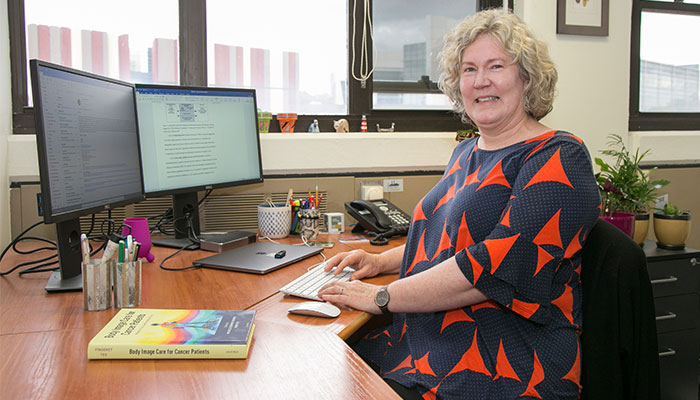Having an accepting outlook and being kind to yourself means you’re less likely to develop a negative body image after a breast cancer operation, says Professor Kerry Sherman from Macquarie’s Centre for Emotional Health.

Pen to paper: researchers found women who took part in the online writing therapy project felt more positive about their body image.
Prof Sherman's research team has also developed an online writing therapy called My Changed Body, designed to alleviate the negative feelings many breast cancer survivors have about how their body looks and feels, which can impair recovery.
In a study published this year in the journal Psycho-Oncology, Sherman’s team surveyed 215 women from Breast Cancer Network Australia, the peak national body for people affected by breast cancer.
The body is only the wrapping paper - your soul is enclosed inside your body and this is far more important.
- Breast cancer survivor Susan's letter to herself
“Our findings indicate that if you can treat yourself with a kind, understanding and accepting demeanour – particularly during times of adversity - and appreciate that adversity and suffering is part of the human experience, then you also acknowledge your thoughts and feelings in an honest and non-judgemental way.”
Body image 'disturbance' affects one in three breast cancer survivors, Sherman says. About 25 per cent of women develop long-lasting anxiety and depression.
Beach body anxiety
Other research shows that for as long as 20 years after surgery, women can still suffer from body image concerns, even if anxiety and depression are no longer a concern. This can affect how confident they feel exposing their body in public situations, such as when they go to the beach or the pool, shopping for clothes or becoming involved in an intimate relationship with a new partner.

Changing perception: Professor Sherman said the aim of her research was to encourage women to see their bodies more compassionately.
“One in eight women will get breast cancer before they are 85, so we have a really geographically dispersed population of women across the country. We thought using the web was the best way to reach them,” Sherman says.
In the My Changed Body intervention, women write about how they feel about their own body after cancer surgery and treatment and a negative experience they’ve had exposing themselves. Then they write about how they would advise a close friend in a similar situation.
“In most circumstances, women show understanding and kindness and concern when they write to a close friend,” says Sherman. “Doing this helps them put a little distance from their own troubles and thinking, and focus instead on how they might help another person.”
Writing therapy works
“The body is only the wrapping paper,” writes breast cancer survivor Susan. “Your soul is enclosed inside your body and this is far more important.” Another participant, Carmen writes: “Our appearance as a result of treatment should be worn as a badge with pride to say that I had cancer but I will be a survivor.”
To assess the intervention’s effectiveness, Sherman's team conducted a randomised control trial with 304 participants across Australia. The results were published in the Journal of Clinical Oncology .Some women who took part also had lymphoedema, swelling in the arm caused by removal of the lymph nodes and cancer treatment.
The trial was successful, Sherman says, with most women reporting improved perception of their body image, even up to three months after they’d done the writing exercise. Her team wants to do more research to determine the best way to make these changes long lasting.
“The aim of this research was to encourage women to think much more positively about themselves, and appraise what happened to their body in a positive way,” she says. “We hope by being more self-compassionate they will look at themselves differently.”
Professor Kerry Sherman is Deputy Head in the Department of Psychology and a member of the Centre for Emotional Health.



